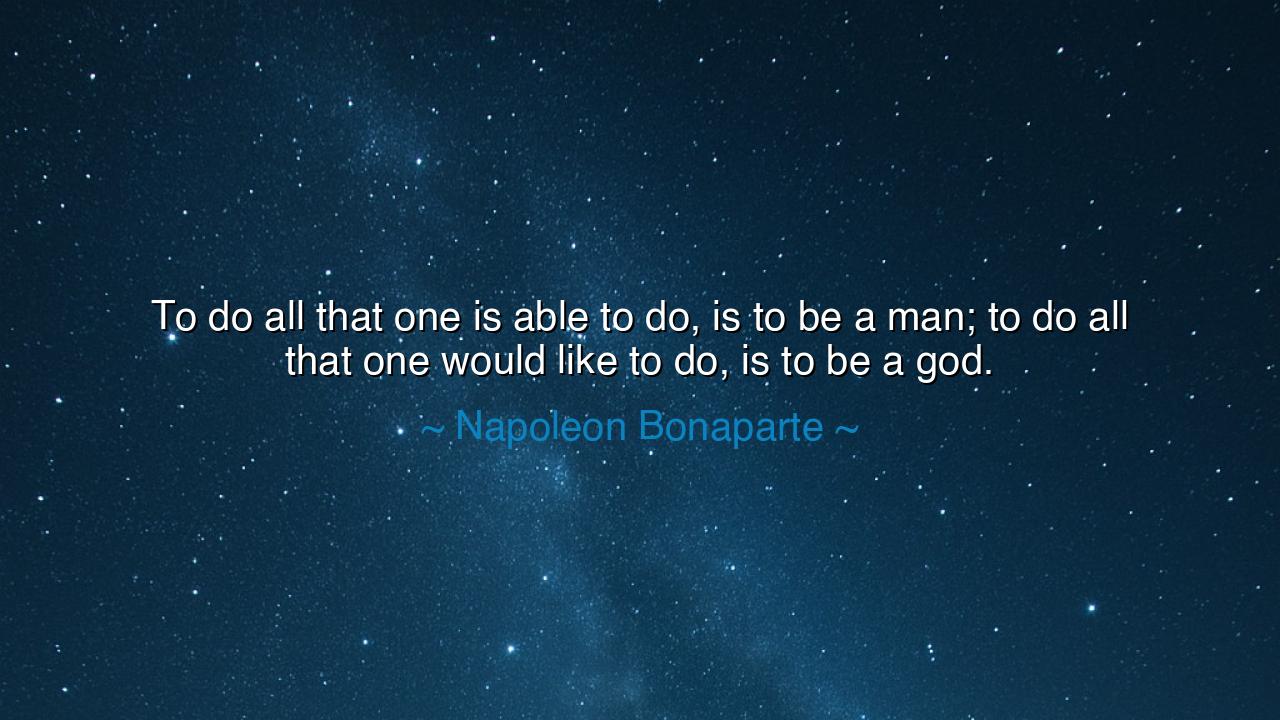
To do all that one is able to do, is to be a man; to do all that
To do all that one is able to do, is to be a man; to do all that one would like to do, is to be a god.






“To do all that one is able to do, is to be a man; to do all that one would like to do, is to be a god.” — Napoleon Bonaparte
Hear now, O seeker of greatness, the words of Napoleon Bonaparte, the man who dreamed of empires and commanded the destinies of nations. In this saying, spoken with the wisdom of a conqueror who had tasted both glory and exile, lies a profound reflection on the limits of human power and the nature of divine perfection. Napoleon, who once ruled much of Europe, knew better than most the reach and restraint of mortal will. When he declares that “to do all that one is able to do, is to be a man; to do all that one would like to do, is to be a god,” he speaks of the eternal tension between ambition and limitation, between the hunger to achieve and the acceptance of finitude.
The origin of this quote springs from the depths of Napoleon’s own experience. For he, more than any man of his age, had pressed the boundaries of what a single human could accomplish. Rising from obscurity on the island of Corsica, he became master of armies, emperor of a vast realm, and legend in his own lifetime. Yet even he, with all his genius and determination, could not command fate itself. He learned, through defeat and isolation, that to be a man is to strive mightily within the sphere of possibility — and to fall short of omnipotence is not failure, but truth. The gods alone, he realized, fulfill every desire of their will; men must find dignity in doing all that they can.
In these words, Napoleon acknowledges both the nobility and the tragedy of human existence. To be a man is to labor under limits — of time, of strength, of circumstance — yet to rise each day and strive regardless. The great task of life is not to attain the infinite, but to approach it. The mortal who pours his entire being into the work of his hands, who wrings from his talents every ounce of effort, becomes truly human. He has fulfilled the divine intention for mankind: not perfection, but perseverance. For as the river does not cease because it cannot flood the ocean, neither should man cease because he cannot be god.
Consider the story of Leonardo da Vinci, the restless genius of the Renaissance. He dreamed of machines that could fly, cities that could cleanse themselves, and paintings that captured eternity. Yet much of his vision was left unfinished. His notebooks overflowed with ideas that outpaced his era’s technology. By the measure of his imagination, he failed; yet by the measure of his ability, he triumphed. For Leonardo did all that a man could do, reaching beyond the horizon of his time. He lived Napoleon’s truth: the divine may dream without boundary, but the human earns greatness through striving against his own.
Napoleon’s statement also bears a warning for the proud. To wish to do all that one desires is to chase the throne of God — and such desire, unchecked by humility, brings ruin. It was this same temptation that felled the conqueror himself. In his ambition to rule without restraint, he overreached, and the world that once knelt before him turned against him. Thus his words carry not only wisdom, but repentance. They teach that to be human is to act within the circle of possibility, but to pretend to divinity is to invite destruction. The wise man knows where effort ends and acceptance begins.
Yet let no heart take these words as a call to resignation. Napoleon does not bid us to be content with mediocrity, but to labor with all our might. To do all that one is able to do is no small command. It means to push the body to endurance, the mind to mastery, and the soul to integrity. It means to meet each day’s challenge with courage and discipline, to live so fully that when the end comes, one can say, “I have given all that I was given.” To live thus is to touch the divine through the act of striving — to approach godhood not by power, but by purpose.
So, O listener, take this teaching into your heart: strive without envy, achieve without arrogance, and accept without despair. You are not called to do all that you wish, but to fulfill all that you can. The seed does not curse the sky for being far; it simply grows toward it. Let that be your way. Use your gifts to their fullest measure, and let your limitations remind you of your place in the grand design. For to act with all your might is to be truly human — and to recognize your limits is to honor the divine. Thus, in the harmony between striving and surrender, man finds both greatness and peace.






AAdministratorAdministrator
Welcome, honored guests. Please leave a comment, we will respond soon